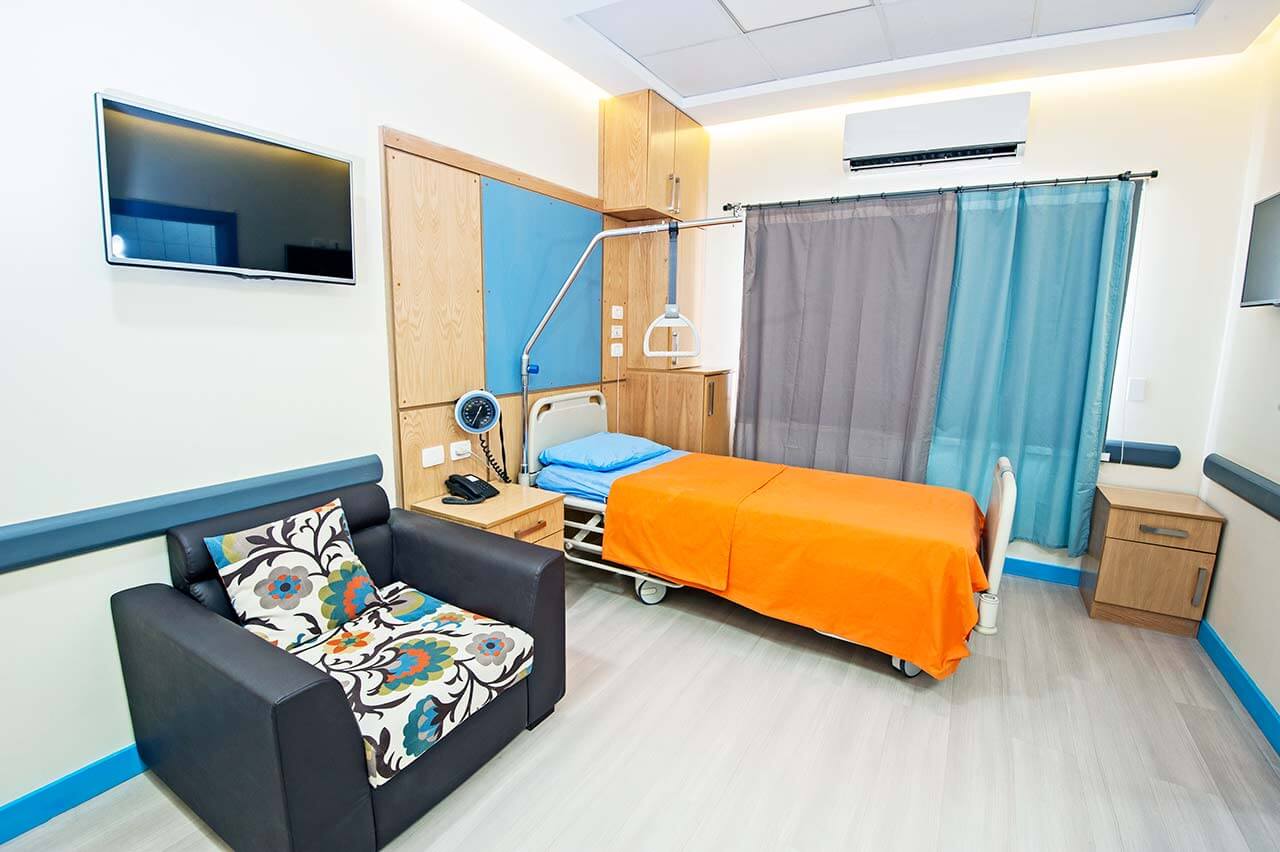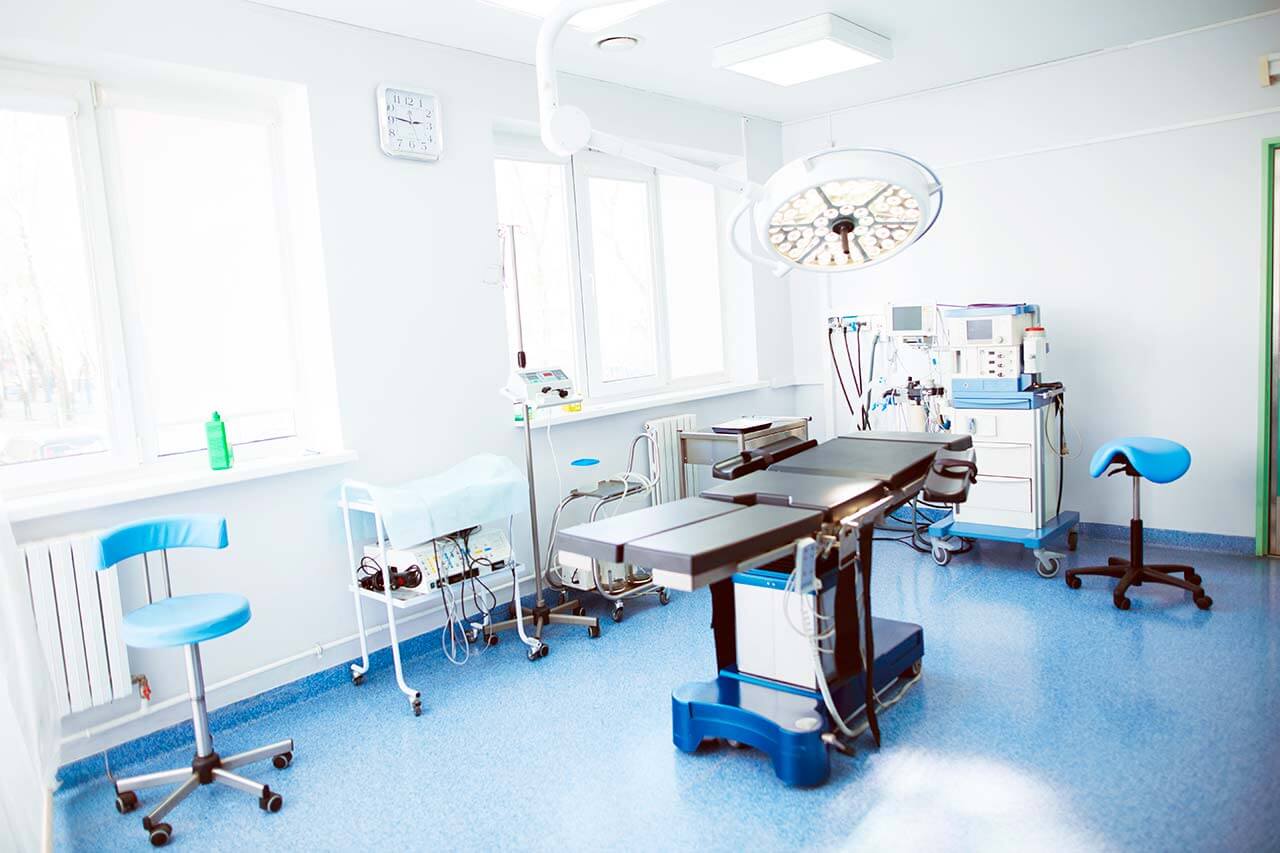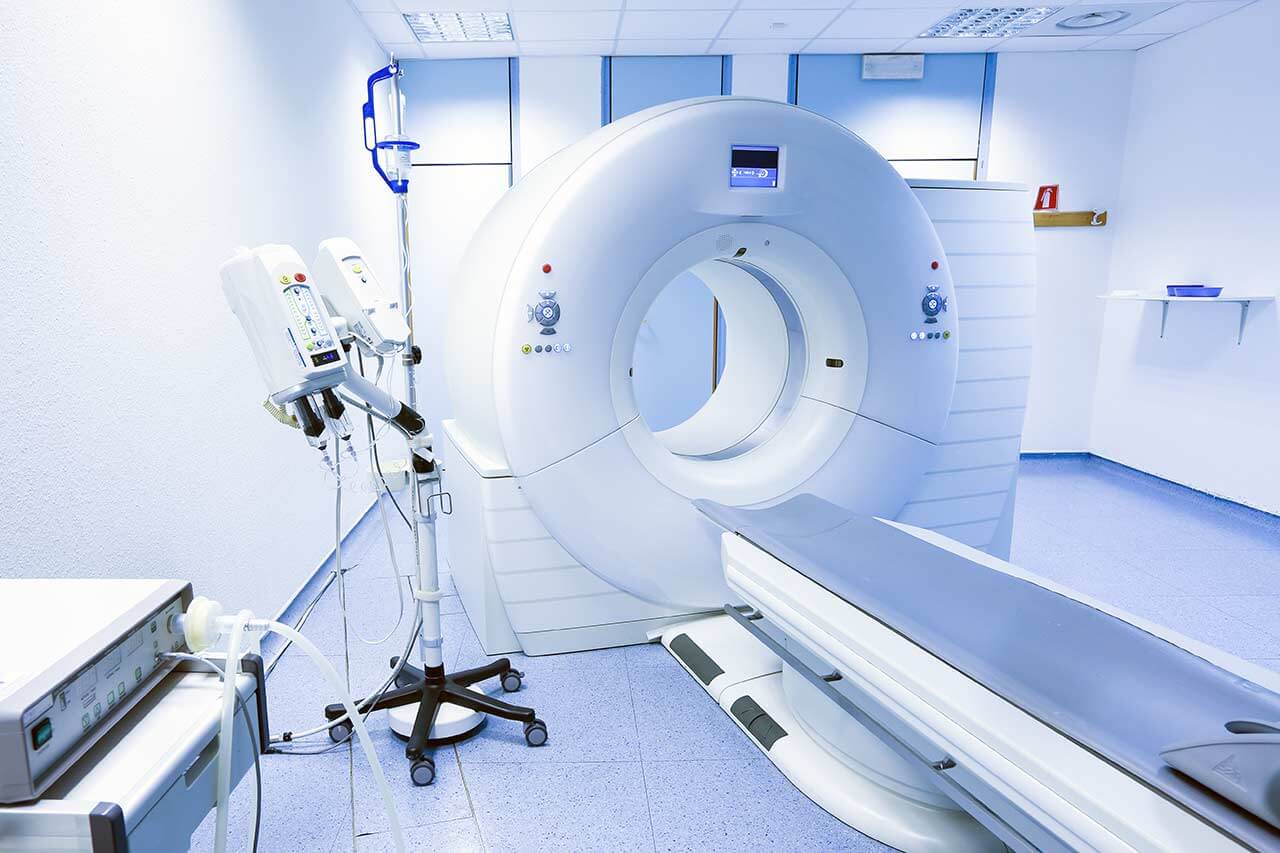
The program includes:
- Initial presentation in the clinic
- clinical history taking
- physical examination
- review of medical records
- laboratory tests:
- complete blood count
- general urine analysis
- biochemical analysis of blood
- TSH-basal, fT3, fT4
- indicators of inflammation (CRP, ESR)
- indicators blood coagulation
- abdominal ultrasound
- CT/MRI abdomen
- preoperative care
- Splenectomy
- symptomatic treatment
- control examinations
- the cost of essential medicines and materials
- nursing services
- nutrition recommendations
- full hospital accommodation
- explanation of future recommendations
Required documents
- Medical records
- Complete blood count (if available)
Service
You may also book:
 BookingHealth Price from:
BookingHealth Price from:
About the department
The Department of General and Abdominal Surgery, Colorectal Surgery, Hepatobiliary Surgery, Endocrine Surgery, Hernia Surgery and Bariatric Surgery at the Municipal Hospital Karlsruhe offers the full range of surgical treatment of diseases of the stomach, bowel, esophagus, liver, gallbladder and biliary tract, thyroid gland and all types of hernias. The department's surgical team also specializes in the surgical treatment of morbid obesity. In most cases, the specialists use sparing minimally invasive techniques. In addition, the medical facility successfully performs da Vinci® robot-assisted surgery, which is only available in 40 hospitals throughout Germany. Robot-assisted interventions are most often performed for the resection of the sigmoid colon, rectum, liver, esophagus, etc. In total, the department provides treatment to about 3,500 inpatients and more than 1,500 outpatients every year. The department has 70 beds, as well as 16 beds in the interdisciplinary Surgical Intensive Care Unit. The department provides top-class surgical services in compliance with modern standards. The medical facility also offers high professionalism and rich experience of the best German surgeons. It is important for the department's specialists to surround the patient with attention and care, thereby supporting them on their path to recovery. The department is headed by Dr. med. Jörg Baral.
Of particular interest for the department's general and abdominal surgeons is the treatment of esophageal and stomach malignancies, as well as gastroesophageal reflux disease. With appropriate clinical indications, doctors perform low-traumatic laparoscopic interventions. In the case of esophageal cancer, the classical method of surgical treatment is en bloc esophageal resection with radical lymph node removal and replacement of the esophagus with a gastric tube. In some cases, surgeons perform esophageal plastic surgery with the replacement of the tissues of the organ with a part of the large or small intestine. In the early stages of cancer with localization of the tumor in the lower part of the esophagus and without regional metastasis, partial resection is usually performed. The department's surgeons also have long successful experience in the surgical treatment of gastric cancer, as they perform more than 50 operations for the treatment of this type of cancer every year. The most common intervention is total or partial stomach removal with DII lymphadenectomy. Small tumors of the stomach wall can be operated laparoscopically. The department also performs stomach surgery for benign pathologies: for example, in the case of ineffective drug therapy for chronic gastroesophageal reflux disease, the surgeons of the medical facility offer patients laparoscopic fundoplication.
Another important focus of the department's work is the treatment of bowel diseases, including operations on the anal sphincter (within the specialized center). The department's surgeons perform more than 500 interventions on the bowel every year. Whenever possible, they perform minimally invasive surgery, including with the help of the da Vinci surgical system. The department specializes in transanal endoscopic microsurgery, TaTME rectal resection (transanal total mesorectal excision) and other surgical techniques. Laparoscopic anterior rectal resection is used to treat chronic recurrent diverticulitis (the most common inflammatory bowel disease). Of particular interest is bowel cancer treatment. The scope of tasks of doctors in this area also includes the treatment of hemorrhoids, anal fistulas, abscesses, fissures, pathological skin changes in the anal area, etc.
In the field of hepatobiliary surgery, the department provides the surgical treatment of diseases of the liver, gallbladder and biliary tract. The department's surgeons often perform laparoscopic liver surgery and partial liver resections, so they can be justifiably proud of their outstanding skills in these areas of treatment. The most common pathologies that require patients to undergo liver interventions are liver malignancies and liver metastases. To achieve the optimal results of surgical treatment, the operation is often preceded by preparatory procedures, such as portal vein embolization and the preparatory phase of a two-stage liver resection using the ALPPS procedure. In cooperation with the specialists from the Departments of Interventional Radiology and Nuclear Medicine, the department's doctors perform radiofrequency ablation, transarterial chemoembolization and selective internal radiation therapy. The department also admits patients with gallstone disease. The most effective and sparing treatment method for this pathology is laparoscopic cholecystectomy. In particularly complex cases, open surgery may be required for gallbladder removal.
The department's endocrine surgeons specialize in the surgical treatment of thyroid diseases: goiter, including nodular goiter, hyperthyroidism and thyroid cancer. The medical facility also performs surgery for parathyroid diseases. Prior to surgery, the patient must undergo ultrasound examinations and hormone blood tests. Whenever required, a fine-needle aspiration biopsy, scintigraphy and MRI scans can also be performed. Based on the diagnostic results, surgeons plan the type of a surgical approach and the extent of the resection: total, unilateral or subtotal removal. The specialists most often use low-traumatic surgical techniques and special monitoring systems to avoid vocal cord lesions. All thyroid surgeries are performed under general anesthesia. The period of hospitalization after thyroid surgery does not exceed 2-3 days.
The department's surgeons also have excellent skills in the field of hernia repair. With the availability of all modern techniques in this area, the department annually performs more than 300 hernia repair procedures. These are often combined operations, that is, an open intervention combined with minimally invasive techniques. Depending on the particular clinical case, the operation can be performed both on an inpatient and outpatient basis. The department specializes in the treatment of inguinal hernia, umbilical hernia, incisional and femoral hernia.
The department offers the services of a modern Obesity Center. The therapeutic options of this center include conservative and interventional treatment regimens that are individually adapted to the needs of each patient. The department annually performs more than 200 bariatric interventions. Thanks to its unique expertise and successful treatment results, the center was recognized as the Center of Excellence for Obesity of the German Society of General and Visceral Surgery (DGAV).
The department's main clinical activities include:
- General and abdominal surgery
- Surgical treatment of diseases of the esophagus, stomach and other gastrointestinal organs
- Esophageal cancer
- Stomach cancer
- Bowel cancer
- Gastroesophageal reflux disease
- Diverticulitis
- Pancreatic diseases
- Surgical treatment of diseases of the esophagus, stomach and other gastrointestinal organs
- Colorectal surgery
- Surgical treatment of diseases of the rectum, anus and colon
- Haemorrhoids
- Anal fistulas
- Anal abscesses
- Anal fissures
- Pathological skin changes in the anal area
- Surgical treatment of diseases of the rectum, anus and colon
- Hepatobiliary surgery
- Surgical treatment of diseases of the liver, gallbladder and biliary tract
- Liver cancer
- Liver metastases, including those caused by cancers of other localization
- Gallstone disease
- Surgical treatment of diseases of the liver, gallbladder and biliary tract
- Endocrine surgery
- Surgical treatment of thyroid and parathyroid diseases
- Simple nontoxic goiter
- Nodular toxic goiter
- Graves' disease
- Various types of thyroid cancer
- Parathyroid dysfunction (hyperparathyroidism)
- Surgical treatment of thyroid and parathyroid diseases
- Hernia surgery
- Surgical treatment of inguinal hernias
- Surgical treatment of umbilical hernias
- Surgical treatment of incisional hernias
- Surgical treatment of femoral hernias
- Surgical treatment of epigastric hernias
- Bariatric surgery
- Conservative and surgical treatment of obesity (within the specialized center)
- Conservative treatment methods
- Diet therapy
- Sports
- Psychological care
- Surgical treatment methods
- Sleeve gastroplasty
- Roux-en-Y gastric bypass
- Loop gastric bypass (Omega Loop) with anastomosis
- Biliopancreatic diversion with duodenal switch
- Biliopancreatic diversion (Scopinaro's procedure)
- Endoscopic implantation of an intragastric balloon
- Plastic reconstructive interventions
- Conservative treatment methods
- Conservative and surgical treatment of obesity (within the specialized center)
- Other surgical options
Curriculum vitae
Higher Education
- 1990 - 1991 Human Medicine Studies, University of Freiburg.
- 1984 - 1990 Human Medicine Studies, University of Tuebingen.
Professional Сareer
- 1991 - 1993 Internship, Department of General and Abdominal Surgery, Colorectal Surgery, Hepatobiliary Surgery, Endocrine Surgery, Hernia Surgery and Bariatric Surgery at the Municipal Hospital Karlsruhe.
- 1993 - 1994 Internship in the Department of Pediatric Surgery at the Municipal Hospital Karlsruhe.
- 1994 - 1997 Preparation for board certification in Surgery: work in the field of Surgical Intensive Care (13 months), Traumatology and Reconstructive Surgery (20 months), General, Abdominal and Thoracic Surgery (29 months), Surgical Endoscopy (6 months) and Vascular Surgery (6 months).
- December 1997 Board certification in Surgery.
- 1997 - 2000 Advanced training in Traumatology and Reconstructive Surgery, Municipal Hospital Karlsruhe.
- December 1999 Specialization in Traumatology.
- Since May 2000 Surgeon in the Department of General and Abdominal Surgery, Colorectal Surgery, Hepatobiliary Surgery, Endocrine Surgery, Hernia Surgery and Bariatric Surgery at the Municipal Hospital Karlsruhe.
- December 2005 Specialization in Abdominal Surgery.
- March 2007 Additional qualification in Proctology.
- March 2008 Coloproctology Examination, European Board of Surgical Qualification (EBSQ).
- Since April 2009 Head of the Department of Rectal Surgery and Proctology.
- Since August 2021 Head of the Department of General and Abdominal Surgery, Colorectal Surgery, Hepatobiliary Surgery, Endocrine Surgery, Hernia Surgery and Bariatric Surgery at the Municipal Hospital Karlsruhe.
Memberships in Professional Societies
- German Society of Surgery (DGCH).
- Professional Association of German Surgeons (BDC).
- German Society of General and Visceral Surgery (DGAV).
- Working Groups on Colorectal Surgery, Endoscopy, Sonography and Minimally Invasive Surgery of the German Society of General and Visceral Surgery (DGAV).
Photo of the doctor: (c) Städtische Klinikum Karlsruhe
About hospital
The Municipal Hospital Karlsruhe is a modern maximum care medical facility, which combines a long tradition and the advanced achievements of modern medicine. The hospital operates on the basis of the University of Freiburg, so scientific innovations in the field of diagnostics and treatment are continuously introduced into practice here. The hospital presents almost all areas of modern medicine, including many medical services for young patients.
A highly qualified and experienced team of more than 4,500 employees provides impeccable medical care. The medical facility has 1,571 beds for the hospitalization of its patients. The hospital admits more than 63,000 inpatients and about 186,000 outpatients annually. A large number of patients wishing to receive medical care in the hospital speak for themselves and are a confirmation of the exceptional service, as well as the effectiveness of the treatment provided.
The quality management system of the hospital's medical care is certified in accordance with the DIN EN ISO 9001 standards. Since 2016, the hospital has implemented a regular quality control in compliance with the strict standards of the Initiative Quality Medicine (IQM). In addition, almost all departments of the hospital have numerous certificates in their areas of specialization, including certificates from the German Cancer Society (DKG), the German Society for General and Visceral Surgery (DGAV), the German Cardiac Society (DGK), the German Diabetes Society (DDG), the German Society of Nephrology (DGN), the German Trauma Society (DGU), etc.
The main value of the hospital's staff is the health and satisfaction of their patients, so a respect and a humane attitude towards each patient remain priorities. The doctors and nursing staff support each patient in every possible way on their path to recovery. The specialists also strive to perform the most sparing, but at the same time the most effective and safe treatment.
Photo: (с) depositphotos
Accommodation in hospital
Patients rooms
The patients of the Municipal Hospital Karlsruhe live in cozy patient rooms with everything necessary for a comfortable stay. Standard patient room furnishing includes an automatically adjustable bed, a bedside table, a TV, and a telephone. The patient rooms have Wi-Fi. Each patient room also has an ensuite bathroom with a shower and a toilet.
The patient rooms in the pediatric departments are specially designed for children, so that young patients feel at home. Children can live in their patient room with one of their parents. There are also special playrooms designed for children.
Meals and Menus
The patients of the hospital are offered tasty and varied three meals a day: breakfast, lunch and dinner. The menu also features dietary meals. The kitchen staff will gladly accept all the individual wishes of patients.
The hospital also has a cozy cafe where one can have a tasty snack, drink tea, coffee and soft drinks.
Further details
Standard rooms include:
Religion
The hospital has two chapels that regularly host Protestant, Catholic, and Ecumenical worship services. A patient can watch the broadcast of the worship on TV channels in his own room, if desired.
Accompanying person
Your accompanying person may stay with you in your patient room or at the hotel of your choice during the inpatient program.
Hotel
You may stay at the hotel of your choice during the outpatient program. Our managers will support you for selecting the best option.





